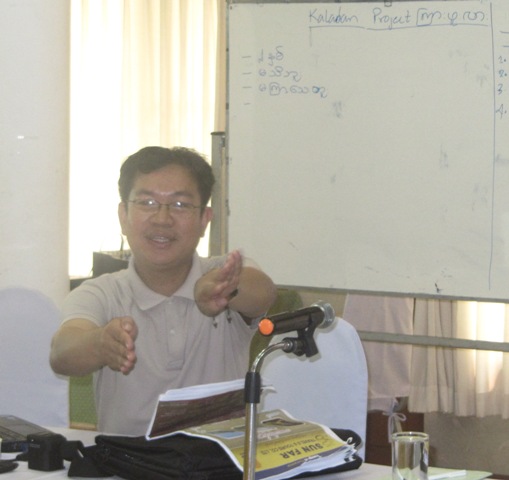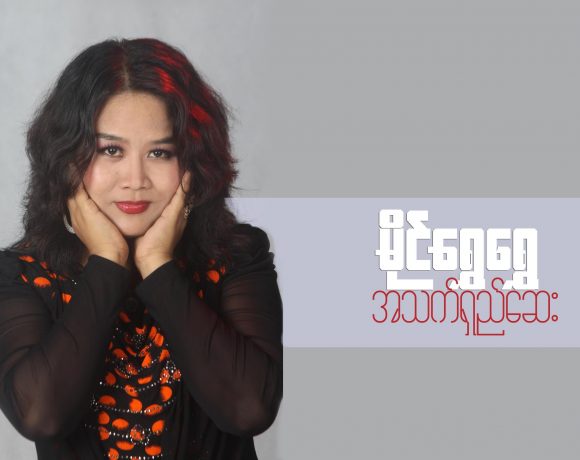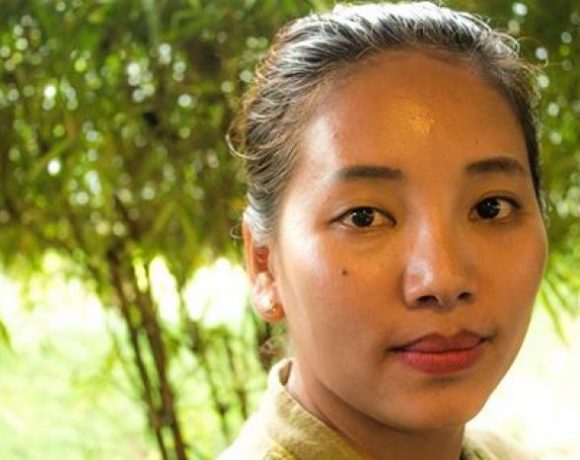Transparency & Accountability Needed in Kaladan Project: Interview with Isaac Khen

10 October 2012 (Chinland Guardian): The Kaladan Multi-Modal Transit Transport Project, a multi-million dollar joint venture agreed in 2008 between India and Burma, is designed to connect the eastern Indian seaport of Kolkata with Sittwe port of Rakhine State in Burma by sea, and link Sittwe to Mizoram via river and road transport through Chin State.
Started in late 2010, the project originally planned to be finished in 2014 is set for its completion in December 2016. An Indian company called Essar Projects Ltd. has been responsible for port construction and river dredging.
Rights groups have raised concerns about various forms of possible human rights violations including forced labour, land confiscation, and increased militarization in the project area. Isaac Khen, Executive Director of GDI (Gender and Development Initiative), a Rangoon-based organization that has been actively involved in monitoring the Kaladan project, talked to Van Biak Thang of Chinland Guardian about the latest updates and views of the local communities.
Chinland Guardian: Update us on the progress of the Kaladan Project now.
Isaac Khen: Recently, demonstration of Essar’s local workers happened in Sittwe, the capital of Rakhine State. The local workers demonstrated because they didn’t get their wages regularly. Besides, on 31 July 2012, Sittwe residents sent a request letter to Port Officer of Rakhine State Port Authority to instruct Essar to stop construction work at night because it was so noisy and patients from Sittwe General Hospital were unable to bear.
It seems that Essar is commencing their work in the midst of conflict situation in Rakhine State. It seems they are neglecting the suffering of local women and men. However, we heard that there is no activity for jetty construction in Paletwa of Chin State at the moment.
Myanmar Government has already admitted that there are no social and environmental impact assessments for Kaladan project from Sittwe to Indian border. According to the Deputy Minister of Transport, Myanmar government is coordinating with Indian government to conduct assessments. However, no information is released yet by the government that which organization has been awarded based on what qualification. We also heard that the project completion date has been postponed till December 2016, but we do not know whether it is correct or not.
Chinland Guardian: Burma’s government mentioned earlier that they would allow impacts assessment to be conducted in the areas.
Isaac Khen: Yes. But it is learned that it is not consecutive assessment. It is only for road construction in Paletwa Township. We want the assessments should be consecutive.
Chinland Guardian: We have learned that your organization, Gender and Development Initiative (GDI), has been active in monitoring the Kaladan Project. Why did you as a gender development organization decide to work on the Kaladan issue and what were your findings during your previous assessments on the project?
Isaac Khen: One of the GDI’s mandates is to work for protection of the rights of local women and men from marginalized ethnic communities. Out of women and men, women are usually more victimized by such kind of project. This is the main reason why we engage in this advocacy.
Moreover, when we think about social impacts, it is very much important to consider how the project impacts differently to women and men. In Kaladan project, what we found through our study was local women would suffer more because their resiliency is weak due to poverty, limited access to information, and traditional male-dominant social system. GDI really concerns about women’s and girls’ accessibility to infrastructure development by the end of project.
Chinland Guardian: So, how well are the local people aware of the possible impacts, both negative and positive, from the Kaladan Project?
Isaac Khen: Many people living in townships are aware of the possible impacts, both negative and positive. According to our study, there are both pro- and anti-project in the region. Lack of transparency and lack of adequate consultation with local communities are contributing factors for increasing fears and concerns among local communities. For those who are welcoming the project, I wish that they would not be blind optimists.
Chinland Guardian: Is GDI working with any other partner organizations on the Kaladan Project?
Isaac Khen: GDI is mainly working with local communities along the Kaladan river because they are the primary actors to protect their own rights. Our role is just to encourage and support them to be able to exercise their rights, and to advocate both governments to observe their obligation to the people. In the national level, a total of 15 civil society organizations who have the same understanding and commitment are joining in hands with us. We also have international friends. We never work alone because this is not GDI’s issue but a national issue.
Chinland Guardian: Recently, Chin political parties such as CNP (Chin National Party) and CPP (Chin Progressive Party) came up with different views on their impacts assessment after making a trip to the site. What are your views?
Isaac Khen: I don’t have any comment on it because I sincerely believe that they have their own rights to choose and say for their own people. GDI is not a Chin organization but national organization firmly standing on our principle of protection of rights of the minority people in Myanmar. GDI is engaging in this advocacy because we have evidences that the rights of local women and men are being violated by the project. We have already communicated this with representatives of both governments. GDI works on evidences. Actually, we are not saying that the project is not good, but what we are saying is that the practice is not transparent and rights of local women and men are not observed. We are saying that the project should be accountable to local communities, and should respect the rights of the local residents.
Chinland Guardian: We have heard some voices from the communities that they have not got any compensation for relocation while others said the compensation is insufficient. What is actually going on?
Isaac Khen: Yes. Recently, one gentleman from Paletwa met me at my office saying that his farmland which was at least three hundred thousand Kyat worth two years ago is given twenty thousand Kyat by the project staff (he thought they are staff from the Essar company). He explained that there was no prior consultation about this, and he doesn’t know how to do – to accept it or not. This is just an example. More or less, we usually receive such information.






